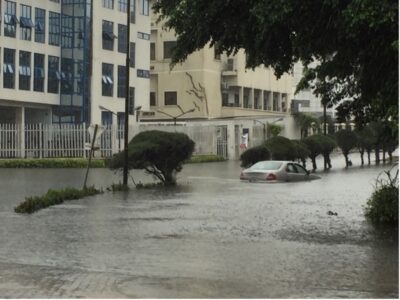Feeling the Heat
The forecast for the end of this century seems to be getting worse. New measurements, reported by E&E here, indicate that Greenland is shedding ice rapidly — and Antarctica is also shedding:
Ice sheets in Greenland and Antarctica are shrinking three times faster than they were in the 1990s, and their contribution to global sea level rise is growing, according to a new study by many of the world’s top ice experts.
Melting of the two massive polar ice sheets raised the world’s oceans 11.1 millimeters between 1992 and 2011, or just under half an inch, accounting for about one-fifth of the total sea level rise during that period.
Scientists already knew that sea level rise was at or above the high end of model predictions, as discussed here, and the polar melting may well be the reason. One meter (more than a yard) of sea level rise is now looking like an increasing possibility.
In the meantime, predictions about temperature rise are also gloomy. Business-as-usual — meaning the continuation of current trends — could result in a 4 degree temperature increase well before the end of the century. (See here). The World Bank has issued a report warning of the dangers of a 4 degree Celsius increase. The key conclusion:
The 4°C scenarios are devastating: the inundation of coastal cities; increasing risks for food production potentially leading to higher malnutrition rates; many dry regions becoming dryer, wet regions wetter; unprecedented heat waves in many regions, especially in the tropics; substantially exacerbated water scarcity in many regions; increased frequency of high-intensity tropical cyclones; and irreversible loss of biodiversity, including coral reef systems.
And most importantly, a 4°C world is so different from the current one that it comes with high uncertainty and new risks that threaten our ability to anticipate and plan for future adaptation needs.
Like interstellar colonizers in a science fiction movie, our children may be living on a new planet, superficially like the earth we know, but with unpredictable differences and unknown dangers.
Reader Comments
2 Replies to “Feeling the Heat”
Comments are closed.








Dan said:
“… Business-as-usual — meaning the continuation of current trends — could result in a 4 degree temperature increase well before the end of the century…”
It is also possible that the continuation of current trends may not result in a 4 degree temperature increase. Either way, there is no effective technical means of controlling the climate, and we shall always oppose any attempt to raise taxes and fees which is predicated on controlling the climate. Our fervent and effective opposition is bad news for Dan and his ilk, but it’s good news for those of us who cling to objective truth.
Dan said:
“… Business-as-usual — meaning the continuation of current trends — could result in a 4 degree temperature increase well before the end of the century…”
It is also possible that the continuation of current trends may not result in a 4 degree temperature increase. Either way, there is no effective technical means of controlling the climate, and we shall always oppose any attempt to raise taxes and fees which is predicated on controlling the climate. Our fervent and effective opposition is bad news for Dan and his ilk, but it’s good news for those of us who cling to objective truth.